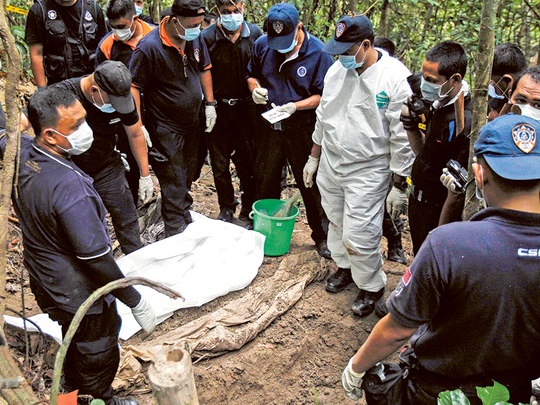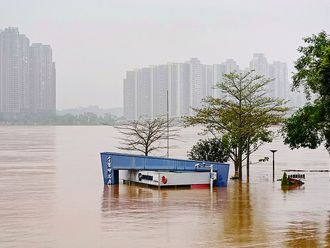
Wang Kelian, Malaysia: Barbed wire and a human jawbone hinted at the brutality in suspected people-smuggling camps in Malaysia as police on Tuesday began the grisly task of exhuming dozens of graves along the Thai border.
Police escorted journalists on a gruelling hike into a thickly jungled state park in northern Malaysia where authorities have found 28 such camps in the latest grim turn in Southeast Asia’s migrant crisis.
Fearing possible attack from armed traffickers lurking in the woods, police advised reporters to hit the ground if they heard any gunshots during the four-hour round-trip slog up a remote mountain.
Via a jungle path that was clearly well trodden, reporters were led to a single small camp in a forest clearing, where barbed wire surrounded two rickety structures made of jungle saplings and bamboo, with tarpaulins lying on the ground.
Nearby, police carrying shovels and white body bags dug up a grave, pulling out a corpse apparently wrapped in a Muslim shroud.
“We have found 37 graves (at the camp) but we have only recovered one body so far,” said local police official Mohammad Bahar Alias.
Malaysian police have said a total of 139 grave sites had been found near abandoned camps spread out along the border and capable of housing hundreds of people.
The Malaysian findings appeared to indicate a system of camps and graves larger than those over the border.
Photos from some of the other camps, provided by police, indicated the presence of small children, including a pair of sandals fit for a toddler, and a pink teddy bear.
Several Malaysian villagers had told reporters on Monday that bedraggled Bangladeshi and Rohingya migrants had become a common sight in the area weeks before the current crisis erupted.
Some bore ugly scars or had bloodied feet from trekking across the frontier, and would beg locals for food and water.
Many were later picked up in private cars and driven away by unknown people, residents said.
The government said it was investigating whether local forestry officials were involved with the people-smuggling gangs believed responsible for nearly 140 such graves discovered around grim camps in the country’s northwest.
“We don’t know if there is a link between the Thai camps and Malaysia camps,” Phuttichart Ekachan, deputy chief of Thailand’s Provincial Police Region 9, said.
“It is possible that because of the Thai crackdown some of the camps moved and some of them [migrants] then walked over or escaped to the Thai side. It is possible but it isn’t something we have been able to confirm.”
Thousands of Rohingya Muslims are ferried by traffickers through southern Thailand each year, and in recent years it has been common for them to be held in remote camps along the border with Malaysia until a ransom is paid for their freedom.
State news agency Bernama quoted Malaysia’s police chief, Inspector General of Police Khalid Abu Bakar, as saying that the camps were thought to have been occupied since 2013, and two were “only abandoned between two and three weeks ago”.
Khalid told reporters on Monday that police had been “shocked by the cruelty” of the fenced camps, where he said there were signs of torture.
The scale of the discoveries has raised questions about the level of complicity by officials on both sides of the border.












